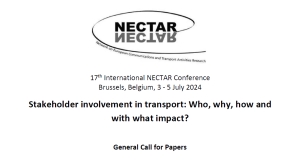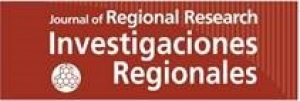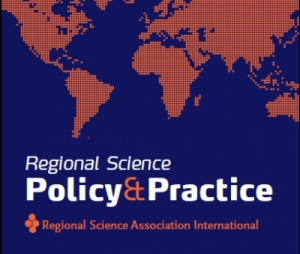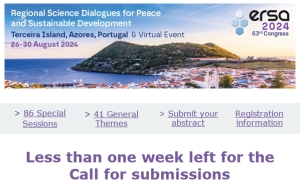Czamanski Dissertation Award
Elisabete Martins
WORKSHOP | The Role of Academic Research in Informing Evidence-Based Policymaking, 12 April 2024, Sarajevo
The main purpose of this first workshop is to mobilize and nurture talents across the Western Balkans, publish a special issue of the journal on Sustainable Regional Development and European Integration in Western Balkans, and support RSAI in the creation of regional science sections in Western Balkans.
The workshop titled "The Role of Academic Research in Informing Evidence-Based Policy Making" aims to explore and emphasize the crucial connection between rigorous academic research and the development of effective, evidence-based policies. In this workshop, participants will delve into how scholarly investigations contribute to the formulation, implementation, and evaluation of policies that address societal challenges.
Key topics covered will include the process of translating research findings into actionable policy recommendations, the importance of robust methodologies in generating reliable evidence, and the role of academia in bridging the gap between research and policy domains. Through discussions, case studies, and interactive sessions, attendees will gain insights into how evidence-based policymaking can be strengthened through a symbiotic relationship with academic research. Ultimately, the workshop seeks to empower participants with the knowledge and tools necessary to foster informed and impactful policy decisions grounded in sound research practices.
In the context of the Western Balkan countries, the workshop on "The Role of Academic Research in Informing Evidence-Based Policy Making" holds particular significance. These nations, undergoing various socio-economic and political transformations, face unique challenges that demand well-informed and context-specific policy interventions. By emphasizing the importance of evidence-based decision-making, the workshop aims to address the specific needs and complexities of the Western Balkan region. Academic research can play a pivotal role in providing tailored insights into the region's challenges, offering data-driven solutions, and guiding policymakers toward strategies that are both effective and culturally relevant. In the context of Western Balkan countries, where policy decisions can have far-reaching implications for regional stability, economic development, and social cohesion, the integration of academic research into the policymaking process becomes not only beneficial but essential. This workshop serves as a platform for fostering collaboration between academia and policymakers, ultimately contributing to the development of robust, evidence-based policies that align with the unique circumstances of the Western Balkan countries.
Participants will have the opportunity to present their research and receive constructive feedback from peers and senior scholars.
More information at: https://www.efsa.unsa.ba/ef/en/about-workshop
Call for Papers | EMN-ISSCR 2024 Conference in Danang (Vietnam), 11-12 July 2024
Annual Regional Sustainable Development Conference 2024
“LOCAL GOVERNANCE, DIGITAL TRANSFORMATION, AND REGIONAL SUSTAINABLE DEVELOPMENT”
CALL FOR COMMUNICATIONS
“Regional sustainable development” is an issue that attracts the interest of academic researchers, policy-makers, and other stakeholders. The Institute of Social Sciences of the Central Region (ISSCR) and the EM Normandie Business School are organizing the third edition of their conference on the nexus between “Local Governance, Digital Transformation, and Regional Sustainable Development” in Da Nang (Vietnam), on 11-12 July, 2024. Very especially, we celebrate this year the 20th anniversary of the ISSCR. The conference aims to promote scientific research on sustainable growth and its implications for regional development, focusing on the role of local governance and digital transformation.
Focus topics
Papers proposed could include the following topics (not limited to):
- Local Governance, Digital Transformation, and Attractiveness
- Local Governance, Digital Transformation, and Poverty Reduction
- Local Governance, Circular Economy, and Sustainability
- Digital Transformation, Innovation, and Sustainable Growth
- Local Governance, Vulnerability, and Resilience
- Local Governance, Digital Transformation, Leadership, and Sustainability
- Local Governance, Digital Transformation, and Maritime Economy
Round table
A mini economic forum on “Development of Maritime Economy in Central Vietnam: Challenges and Prospects.”
Participants: EM Normandie Business School, Institute of Social Sciences of the Central Region, and local agencies and managers.
Submission
Please send an extended abstract or full manuscript through the following website:
While submitting, please specify the topic where the manuscript would be presented in case of acceptance.
Accepted Languages: Vietnamese + English
Important dates
Deadline submission for extended abstract or full paper: April 19th, 2024 Paper notification to authors: May 31st, 2023
Registration open: May 2nd, 2023
Conference Board
- CASTELLANO Sylvaine, Dean of Faculty and research, EM Normandie Business School, France
- HOANG Hong Hiep, Director, Institute of Social Science of the Central Region, Vietnam
- NGUYEN-HUU Thanh Tam, EM Normandie Business School
- TRAN Minh Duc, Vice Director, Institute of Social Science of the Central Region, Vietnam
Scientific Committee
- BOURDIN Sébastien, EM Normandie Business School, France
- BUI Quang Tuan, Director of Vietnam Institute of Economics, Vietnam
- CILLO Valentina, University of Rome “Link Campus”, Italy
- CONDOR Roland, EM Normandie Business School, France
- DEL GIUDICE Manlio, Editor in Chief of Journal of Knowledge Management, Pegaso Digital University , Italy
- DANG Xuan Thanh, Vice Director of Vietnam Academy of Social Science, Vietnam
- ESTAY Christophe, Research and Academic Director, FERRANDI Paris, France
- FARINA Briamonte Massimiliano, University of Rome 3, Italy
- FIANO Fabio, University of Rome “Unicamillus”, Italy
- LAMOTTE Olivier, EM Normandie Business School, France
- JUTEAU Solène, EM Normandie Business School, France
- LARÉ Amandine, Head of Economics, Territories and Sustainable Development Department, EM Normandie Business School, France
- LE Quoc Hoi, Editor in Chief of Journal of Economics and Development, National Economics University, Vietnam
- LE Van Cuong, Associate Editor of Journal of Public Economics Theory, CNRS, Paris School of Economics, France
- LE Van Hung, Vice Director of the Institute of Regional Sustainable Development, Vietnam
- LUONG Tinh, Institute of Social Science of the Central Region, Vietnam
- NAM Sang-Woo, KDI School of Public Policy and Management, Korea
- NGUYEN Truong Son, The University of Danang - University of Economics, Vietnam
- NGUYEN Van Phu, Paris Nanterre University, France
- PALLADINO Rosa, IUL Digital University, Italy
- PAPA Armando, University of Salerno, Italy
- PARK Jin, KDI School of Public Policy and Management, Korea
- PHAM Hoang Van, Hankamer School of Business, Baylor University, United States
- PHAM Si An, Vietnam Academy of Social Sciences, Vietnam
- PHAM Thi Kim Cuong, Paris Nanterre University, France
- PHAN Thi Song Thuong, Institute of Social Science of the Central Region, Vietnam
- RIEBER Arsène, University of Rouen Normandy, France
- TRAN Nam Binh, University of New South Wales, Australia
- TRAN Thi Anh-Dao, University of Rouen Normandy, France
- TRINH Thi Thu, Institute of Social Science of the Central Region, Vietnam
- VENKATESH V.G., EM Normandie Business School, France
- VU Bang Tam, University of Hawaiʻi at Hilo, America
- WON Hee Lee, Han Kyong University, Korea
Local organization committee
- HOANG Hong Hiep
- TRAN Minh Duc
- TRAN Thi Thuy Duong
- BUI Nguyen Hoa
- VO Hoang Phi
- LE Xuan Thong
- TRINH Thi Thu
- PHAN Thi Song Thuong
- LUONG Tinh
- TONG Thi Hai Hanh
- NONG Thi Dieu
- DINH The Toan
- VO Thi Bich Tram
- NGUYEN Hoang Yen
Time and Venue
- Time: July 11thand 12th, 2024.
- Venue: Institute of Social Sciences of the Central Region, Nam Ky Khoi Nghia Street, Ngu Hanh Son District, Da Nang City, Vietnam.
1 day (or 2 days) + 1 day trip: to be confirmed
- 11/7/2024: All-day conference.
- 12/7/2024: Round table (in the morning) and Trip (in the afternoon).
EMN and the Métis lab
Founded in 1871 among the first French business schools, EM Normandie has established itself as a benchmark institution in the world of business schools. It holds the international EQUIS, AMBA, and AACSB accreditations.
With 6,300 students and professionals in its initial and continuing diploma training programs and 23,000 members of the Alumni EM Normandie association worldwide, the school has six campuses (three in France: Caen, Le Havre, and Paris, three abroad: Oxford, Dublin, and Dubai, and two associated: La Martinique and La Réunion). EM Normandie trains the managers of tomorrow, future responsible rulers prepared to lead change in a multicultural environment, and it supports employees and business leaders throughout their careers.
Research activities of the school operate under the framework of the Métis Lab, which comprises six departments: Economy, Territories, and Sustainable Development; Foreign Languages and Humanities; HR and Organization; Law, Finance, and Control; Marketing; Strategy and Entrepreneurship; Supply Chain Management and Decision Sciences. The research policy implemented relies on three strong principles: Practical Intelligence, Cross- disciplinary Knowledge, and Openness towards Professionals.
ISSCR
Founded in 1953, the Vietnam Academy of Social Science (VASS) is a research institution under the Government of Vietnam. VASS is the hub for top scholars in the social sciences and humanities in Vietnam. Currently, the Academy employs more than 2,000 staff, of whom more than 900 are professors and associate professors who hold doctoral and master’s degrees in the social sciences and humanities. They work in seven departments, which support the President, 35 research institutes, and four other non-research institutions.
The Institute of Social Sciences of the Central Region (ISSCR) is an organization for researching social sciences, a representative of the VASS in the Central Region, Vietnam. Its functions are researching fundamental issues about social sciences, consulting for the local and central government, and involving in training workforces for social sciences. Hence, ISSCR can network and connect a wide range of domestic agencies, authorities, stakeholders, and other institutes to launch and implement research projects and coordination relating to social sciences
The 24th Benjamin H. Stevens Graduate Fellowship in Regional Science - FINAL CALL for APPLICATIONS
|
|
ERSA Monthly E-news - January 2024
|
|
|
|
|
|
|
|
|
|
|
|
|
|
|
|
|
|
|
|
|
|
|
|
|
|
|
|
|
|
|
|
|
|
|
Call for Papers | 17th International NECTAR Conference, Brussels, Belgium, 3 - 5 July 2024
17th International NECTAR Conference
Brussels, Belgium, 3 - 5 July 2024
Stakeholder involvement in transport: Who, why, how and with what impact?
General Call for Papers
The involvement of stakeholders is key in the planning and regulation of transport systems, services and infrastructure, the design and deployment of innovations and in the evaluation of transport activities. However, the diversity of stakeholders, their roles and responsibilities and their degree of willingness to participate in research and planning vary greatly across the different transport domains and at different stages of transport planning. Therefore, new methods, approaches, tools, and insights are needed to better understand why stakeholder involvement is important, who are the key actors that should participate, how they can be involved, and what impacts transport has on them. Stakeholder involvement is not only relevant for transport infrastructure projects, but also for supporting the long-term transition of transport towards a low-carbon and sustainable future.
The focus of the conference is on how transport and communications research can support the different roles stakeholders take in transport planning. Stakeholder involvement is understood in the broader sense. We invite papers discussing the following specific topics of interest:
- advancements in the fields of transport and communication in the context of stakeholder involvement,
- development of regulatory approaches and policies,
- stakeholder-based decision support,
- citizen engagement,
- quantitative and qualitative methods to assess the impact of transport on different stakeholder groups.
In addition to these topics, we welcome papers on topics in the fields of transport, communications, and mobility at large. General topics of interest include transport and infrastructure evaluation, transport policy and environment, logistics and freight, tourism, recreation and leisure, housing and labour markets, accessibility analysis, social and health issues, and ICT.
The different NECTAR clusters will also organize specific thematic sessions. Calls for papers for these sessions will be posted on the conference website and the NECTAR website.
The deadline for abstract submission has been extended to February 15, 2024. Abstracts should be submitted electronically, using the form available on the conference website and following the instructions found there:
https://mobilise.research.vub.be/nectar-conference-2024-general-call-for-papers
Criteria for acceptance
Criteria for acceptance are scope, scientific quality, NECTAR membership and the possibility to fit the presentation in a coherent conference session. We allow one paper presentation per participant.
Venue
The NECTAR conference will be organized by the Vrije Universiteit Brussel and hosted on its campus.
Participation and NECTAR membership
Registration, meals, and accommodation for one night will be offered to NECTAR members, for only one author per paper. One night of hotel accommodation will be offered to participants who have confirmed their participation before April 30, 2024. One night of hotel accommodation might be charged in case of late cancellations. All practical details will be communicated through the conference website. In order to participate in the conference, a consecutive and current two-year NECTAR membership is necessary (2023-2024). Non-members can find details of how to join the association on the “Membership” page of NECTAR’s website: www.nectar-eu.eu/membership.
Important dates:
Abstract submission: Jan 31, 2024
Notification of acceptance: March 15, 2024
Confirmation of attendance: April 30, 2024
We look forward to seeing you in Brussels!
Cathy Macharis, Vrije Universiteit Brussel
Imre Keserü, Vrije Universiteit Brussel
Karst Geurs, NECTAR chair
NECTAR is a European-based scientific association. The primary objective is to foster research collaboration and exchange of information between experts in the field of transport, communication and mobility from all European countries and the rest of the world. It is a multidisciplinary social science network bringing together a wide variety of perspectives on transport and communication problems and their impacts on society from an international perspective. For further information on NECTAR, use the link: http://www.nectar-eu.eu.
New Issue 58 of Investigaciones Regionales - Journal of Regional Research
Investigaciones Regionales - Journal of Regional Research has published the 58th Issue, the first volume corresponding to 2024.
Below you will find the summaries of the papers published in this volume, which can be accessed at https://investigacionesregionales.org/en/revista/issue-58/
We invite authors to submit papers at https://investigacionesregionales.org/en/envio-de-articulos/submission-of-papers-and-others-contributions/
On the other hand, we want to share with you the Call for editor in chief of our journal. You have all the information in the following link: https://aecr.org/es/novedad/call-for-applications-editor-in-chief-investigaciones-regionales-journal-of-regional-research-iirr-jorr/ Letters of interest must be received within February 28th, 2024.
Issue 58
European Regional Policy
Diego Sande Veiga
Do the Structural Funds in innovation influence the growth of companies? Analysis through the ERDF-Innterconecta programme in Andalusia differentiating by business size and role in the projects
As a Convergence Objective Autonomous Community of the European Union, Andalusia was a beneficiary of the significant volume of European resources for regional innovation mobilised by the 2007-2013 Technological Fund and the 2014-2020 Smart Growth programme. The Andalusian productive fabric is mostly made up of Small and Medium-sized Enterprises (SMEs). For this reason, we evaluate the impact of the ERDF-Innterconecta programme financed through the previous operational programmes on the main indicators of business growth. The proposed analysis seeks to identify whether there has been an impact for Andalusian companies that have participated in the subsidised projects on three indicators (revenue, GVA, number of employees), further differentiating these companies by size, participation in innovation and role taken in the funded projects. This impact varies according to the characteristics of the companies, being more positive for Large Enterprises (LE), leaders of the projects and for those that had not previously registered research investments in the accountancy.
Keywords: Structural Funds; Regional Innovation Systems; business growth; Policy impact analysis; Large enterprises and SMEs
Articles
Miguel Ángel López García
Housing Subsidies to Low-Income Households: A Survey
This paper reviews a variety of issues related to the design of low-income housing subsidies. We discuss project-based assistance (i.e., public housing and privately-owned subsidized projects) and tenant-based assistance (i.e., rent vouchers and rent certificates), as well as the empirical evidence concerning their effects.
Keywords: Housing policy; low-income housing programs; public housing; rent vouchers.
Rubén Amo Cifuentes, Rafael Granell Pérez, Amadeo Fuenmayor Fernández
Regional impact of the new Tax on Great Fortunes: A microsimulation analysis
The Temporary Solidarity Tax on Great Fortunes came into force in Spain at the end of 2022. This tax managed at state level and complementary to the Wealth Tax, will seek to harmonise the taxation of wealth in all the autonomous communities under the common regime. In this paper the taxation of wealth in Spain is analysed, as well as the reform proposals put forward to date. The new state tax is estimated using microsimulation techniques for the year 2022, with the aim of obtaining the main revenue effects that its implementation will have. Its impact will be unequal between autonomous communities due to the existing differences in the regional regulations of the Wealth Tax.
Keywords: Taxation; wealth; autonomous communities; microsimulation
Felipe Livert, Raymundo Mogollón, Pablo Herrera
Distributive politics and decentralisation in Chile and Peru
The paper presents evidence that decentralisation increases partisan influence in the allocation of non-programmatic resources. The model employs a panel data and fixed effects analysis using data corresponding to intergovernmental transfers from the national level, passing through the regional level and earmarked for investment for local governments in Chile (2008-2018) and Peru (2004 – 2013). The results indicate political influence on the distribution of resources. The distribution of resources is used tactically in both countries in presidential election years. The implementation of laws increasing political decentralisation in Chile and Peru increased the political bias in resource distribution. The results have policy implications and provide a comparative perspective on the development of fiscal institutions in both countries. In a continental scenario, in which Latin American countries are undergoing a strong decentralisation process, it is suggested to advance in reforms that increase transparency, accountability and citizen participation. In addition, it is advisable to limit non-programmatic allocations and provide stability in the distribution of public resources.
Keywords: Distributive politics; decentralisation; Pork barrel; Chile; Peru.
Rafael González-Val, Miriam Marcén
Growth in small cities: The case of Aragon (Spain)
In this paper, we analyse the effects of productive specialisation and diversity on population growth at the local level in Aragon, a NUTS 2 region in Spain. This region is characterised by a highly uneven population distribution, with numerous small cities, and a large proportion of small businesses. We estimate panel data models considering data from 2000 to 2015 at the local level, encompassing 577 municipalities. Our results show that both localisation and urbanisation have a statistically significant positive effect on growth in Aragonese municipalities but only in cities with a population threshold of 3,000 or more inhabitants.
Keywords: Population; agglomeration economies; small and medium-sized enterprises; small cities; Aragon.
Nuria Porras Bueno, María Ángeles Plaza Mejía, David Flores Ruiz
Clustering residents of a Spanish mining site: when attitudes towards tourism are not linked to perceptions
This study uses a segmentation framework to categorize the residents of Minas de Riotinto, a mining town in Andalusia, Spain, based on their perceptions of the personal and community effects of tourism. These segments were then classified according to their tourism attitudes, utilizing a three-dimensional approach encompassing affective, cognitive, and behavioral elements. For this purpose, a cluster analysis and the Kruskal-Wallis test were successively applied to the responses of 346 residents. The results revealed three main groups of residents: “interested and enthusiastic supporters”, “disinterested and moderate supporters” and “incongruous and impulsive residents”. Contrary to our expectations, all groups showed favorable affective attitudes towards tourism development in their region. However, significant differences emerged between groups concerning the cognitive and behavioral dimensions of their attitudes.
Keywords: Tourism impact; resident perceptions; resident segmentation; mining tourism
Manuel Gómez-Zaldívar, Fernando Gómez-Zaldívar
Economic structure and business cycle synchronization: Evidence from Mexico’s states
According to recent studies, the growing economic integration between Mexico and the United States, that resulted from the North American Free Trade Agreement (NAFTA), heterogeneously transformed the economic structure of Mexico’s states. is study provides evidence that this, in turn, altered the degree and nature of economic synchronization among them. Furthermore, it shows evidence of an increasingly significant positive relationship from 1994 on between economic synchronization and the level of sophistication of states’ economic structures [measured by the Economic Complexity Index (ECI)]. As
economic integration increases, it becomes easier for shocks to be transmitted between state economies with similar economic structures, either because their characteristics make them more sensitive to the same kinds of shocks or simply because they are so closely linked. Our results help provide a greater understanding of the states’ economic evolution during the period analyzed.
Keywords: Synchronization and Economic Integration; Economic complexity index.
José Daniel Buendía Azorín, Rubén Martínez Alpañez, María del Mar Sánchez de la Vega
Efficiency in the estimation of technical coefficients and inter-regional multipliers: the Jahn methodology versus the GRAS and Gravity-RAS methodologies
The use of location quotients for the estimation of regional input‑output tables has been found to be a useful and efficient tool to estimate intra-regional production multipliers. Building on this tool, more complex procedures have been developed that simultaneously estimate inter-regional coefficients. This paper assesses the capacity of this extended methodology (called the Jahn methodology) to obtain both intra-regional and inter-regional multipliers for the Spanish case, using the Input-Output Table (IOT) of Spain 2015 to estimate those corresponding to the Spanish regions of Andalusia, the Basque Country and Navarra for the same year and whose results are available via survey. In order to contrast their reliability, efficiency and accuracy, the results obtained with this procedure are then compared with other methodologies widely used for their recognised efficiency, the GRAS and Gravity-RAS methodologies.
Keywords: Location quotients; FLQ; non-survey method; regional input‑output tables; RAS; output multipliers
2nd Conference of the Southern Africa Regional Science Association on Rethinking the Regional Development Opportunities and Challenges in Southern Africa, 19-20 June 2024 | Maputo, Mozambique
Call for Conference Papers and RSPP Special Issue on
Rethinking the Regional Development Opportunities and Challenges in Southern Africa
Call for Papers | RSPP Special Issue: Cost Benefit Analysis for Regional Sustainable Development Projects

Regional Science Policy & Practice (RSPP)
Call for Papers Special Issue: Cost Benefit Analysis for Regional Sustainable Development Projects
Guest editor
Chiara F. Del Bo - Università degli Studi di Milano, This email address is being protected from spambots. You need JavaScript enabled to view it.
The multifaceted long run challenges facing Europe and the world today, and in the years to come, require new and ambitious public policies, especially with respect to their contribution to achieving environmental sustainability. At the same time, it is crucial to identify, develop and use sound methods to assess the impact, efficiency and success of these policies. The regional impact and costs of public interventions and investment is also increasingly relevant and should receive attention by practitioners and academics alike.
Against this backdrop, the aim of this Special Issue is to consider the issue of policies stimulating sustainable development at the regional level, through the lenses of Cost-Benefit Analysis (CBA). This entails considering the social costs and benefits of environmentally relevant projects and policies by focusing on the regional dimension of both implementation and impact. Contributions could present full-fledged CBA, analysis performed by applying similar methods, such as, for example, multicriteria analysis, or zoom in on the cost or benefit side from a social and territorial perspective.
Manuscript submission information:
All submissions must be original and may not be under review elsewhere. All manuscripts will be submitted via the Regional Science Policy & Practice online submission system (https://www.editorialmanager.com/rspp/). Authors should indicate in the cover letter that the paper is submitted for consideration for publication in this special issue “Cost Benefit Analysis for Regional Sustainable Development Projects”, otherwise, your submission will be handled as a regular manuscript.
- Submissions open until October 15, 2025.
Young scholars event at 2024 ERSA annual conference
The Young Scholars Initiative (YSI) and the European Regional Science Association (ERSA) are excited to announce the first “YSI- ERSA Workshop: Young Scholars At The Edge Of Regional Science”. This event will be held in-person on the 26th and 27th of August preceding the on-site part of the 63rd ERSA Conference (28th – 30th August, 2024), that this year will take place in the amazing scenario of Terceira Island, in Azores, Portugal.
Every year, the ERSA congress gathers around 800 participants from all over the globe, and it has become the largest academic congress in regional science worldwide. With this new joint collaboration between ERSA and YSI, the two associations aim to bring together a dynamic group of young scholars with common background (mostly Urban and Regional Economics, Economic Geography and related disciplines) and give them the opportunity to present and discuss their latest work while receiving useful comments and advices from both senior discussants and peers, thus creating a rare occasion of full confrontation and deep dialogue. By this event, ERSA and YSI contribute to reinforce a community of young scholars and future researchers able to learn from one another, to collaborate and to build an inclusive and supportive academic network.
Besides offering the opportunity to present their work and receive comments from renowned mentors and peers, the program includes lectures from guest professors on their latest researches, presenting to young participants an overview on the most cutting edge research in Regional Science.
ERSA dedicates its 63rd conference to “Regional science dialogues for peace and sustainable development”; accordingly, we encourage the submission of innovative contributions on sustainable and inclusive regional development and in particular on the following research themes:
- Peace, Regional and Urban Sustainable Development
- Segregation, Social and Spatial Inequalities
- Twin transitions (Digital & Green)
- Innovation and Regional Development
- Cities, Regions and Digital Transformations
- Climate Adaptive and Resilient Regions and Cities
- Regional and Urban Labour Markets and Entrepreneurship
- Urban-Rural Relationships
- Local and global impacts of conflicts
- Migration and Integration in a Global World
- Quality of government and rise of political discontent
and other related topics.
We particularly encourage the application from young scholars committed to interdisciplinary research, truly believing in the benefits of collaboration among different disciplines.
Application Process
Step 1: PhD Students and Early Career Researcher (5 years from PhD) are invited to submit an extended abstract (between 800 and 1200 words) of their research before 15th February 2024. Please submit your abstract via the application button on this homepage.
Abstracts will be selected based on clarity, relevance and originality, outlining the research question, method and (preliminary) results. We will inform selected applicants by mid-March and subsequently invite them to proceed to Step 2.
Step 2: The selected young scholars are expected to submit a full working paper version before June 1st, 2023 (via email, instructions will follow). Only participants who submit a full paper (draft version is okay) will be able to join the initiative.
Financial support
The workshop is free of charge. Moreover, YSI offers financial support for selected participants, specifically:
- Two-night accommodation in shared apartments or shared hotel rooms (August 26thto August 28th)
- partial travel support, co-financing your own resources.
Please note that admission to the pre-conference workshop does not include the participation to the main ERSA annual conference. We do however encourage workshop participants to exploit the opportunity to attend the main ERSA conference after the workshop. Abstract submission and registration to ERSA Annual Conference are available at this link: https://ersa.eventsair.com/ersa2024/call-for-abstracts
Further information: https://ysi.ineteconomics.org/event/ysi-ersa-workshop-young-scholars-at-the-edge-of-regional-science/
ERSA Congress 2024 | Don't delay it is time to submit your abstract (and) paper
|
|
|
|
|
|
|
|
|
|
|
|
|
|
|
|
|
About Us
The Regional Science Association International (RSAI), founded in 1954, is an international community of scholars interested in the regional impacts of national or global processes of economic and social change.


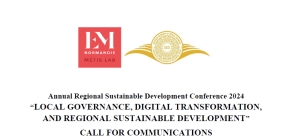
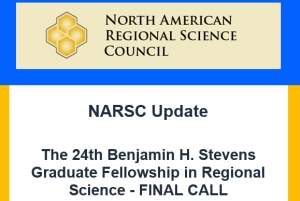



 Dear Members of ERSA, dear Colleagues,
Dear Members of ERSA, dear Colleagues,
















